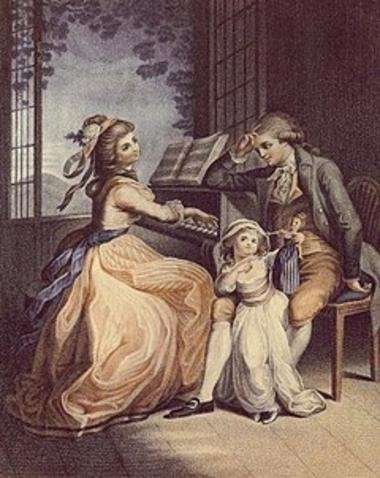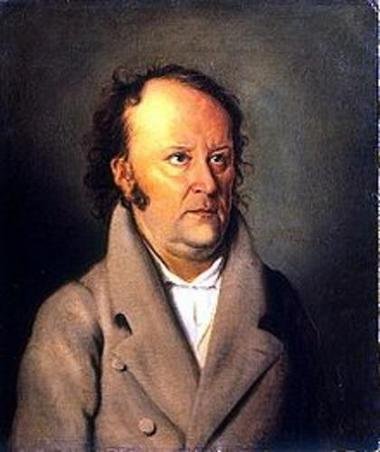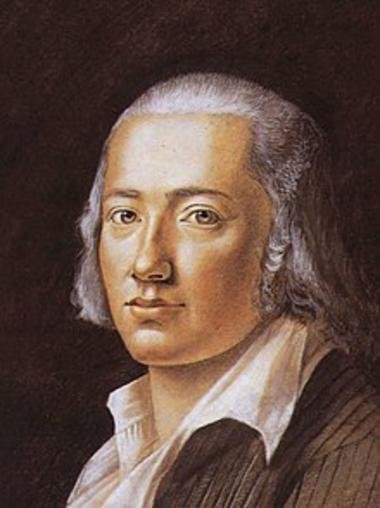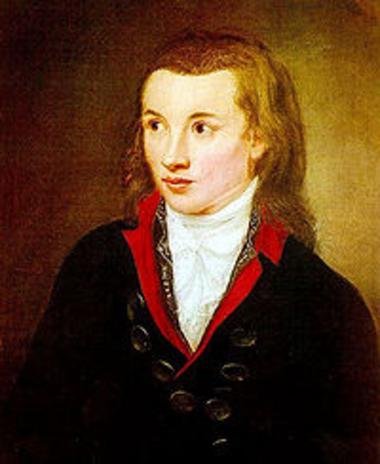ADSactly Literature - Nostalgia for the Whole (German romanticism)

Greetings, reader friends of @adsactly. In a first article on literary modernity, I announced a series on the subject. At that time I began to approach romanticism as an aesthetic-literary movement initiator of modern literature. I now turn to one of its manifestations: German romanticism.
The initiators of romanticism were the Germans and the English, almost at the same time. German Romanticism is regarded as the founding manifestation of Romanticism in general between the late 18th century and the early 19th century. Johann Wolfgang von Goethe (1749-1832, author of the famous work Fausto) stands out as his precursor with novels such as The Sorrows of the Young Werther (1774) and The Apprenticeship Years of Wilhelm Meister (1796). The first tells the tragic life of this character who ends up committing suicide in the face of his impossible love for Lotte; the second, which initiates the sub-genre called "Bildungroman", narrates a young man's decision to abandon his life as a merchant in order to surrender his theatrical vocation, inspired by Shakespeare.
A fragment from the end of Werther:
Charlotte: I do not tremble when I take the terrible and cold chalice that the drunkenness of death will give me. You have presented it to me, and I do not hesitate. (...) Alas, how much I have loved you, from the moment I saw you! From that moment I understood that you would fill my whole life... (...) Alas, I never suspected that this principle would lead me to this end.

 )
)German romanticism will underpin much of the features that will characterize modern consciousness in philosophy, literature, and other arts. Nostalgia for the unity or totality lost at some point in humanity. The recovery of this unitive sense is expressed in the valuation of the synthesis or unity of opposites, and the interdependence of reason with other modes of knowledge such as intuition, dream, magic, imagination. Dreams will be their great creative source, so they are ahead of the surrealists. The analogy is privileged, that principle of similarity between things; man will be conceived as the image of the universe.
Novalis, one of the most important German romantics, will say:
Men march along different paths. Whoever follows them and compares them will see strange figures born, which seem to belong to this great coded writing found everywhere: on the wings, on the shells of eggs, on clouds, on snow, on crystals, on the shapes of rocks, on frozen waters, inside and outside mountains, plants, animals, men (...)
The world will be conceived as a book that we must decipher, read. Hence the value they gave to language. It also highlights the very close relationship between sensitive experience (perceived) and personal experience through reading.

In German romanticism there were autonomous individuals who did not belong to groups such as Jean Paul Richter, Hölderlin, Kleist and Hoffmann. There were two circles. In the so-called Jena group the brothers Friedrich and August Schlegel, Schelling and Novalis stand out; in their magazine Athenäum they published their creations, articles and manifestos, for what is considered the first romanticism. The other is Heidelberg's group, which took an interest in the search for the essence of the German people through oral tradition and popular literature: among its members are the well-known Grimm brothers, compilers and recreators of today's universal stories such as "Snow White and the Seven Dwarfs" or "Cinderella".
Let us take a look at fragments of texts by some of their representatives.

Known simply as Jean Paul (1763-1825), he is a very controversial figure: passionate about the world of dreams, with an analogical vision (among the things of the world there is a secret bond), ironic and heartbreaking; among his themes is the double (the other) and the death of God. It is famous his long, dreamlike and apocalyptic poem in prose "From the top of the building of the world, Christ, dead, proclaims that God does not exist"; of this some small fragments:
Childhood and its terrors, even more than its joys, once again acquire wings and light in the dream and vibrate like fireflies in the little night of the soul. Do not crush those palpitating sparks!
(…)
Suddenly, from on high, a sublime and noble figure descended upon the altar, bearing the traces of unceasing pain, and all the dead cried out, "Christ! Is there no God? Christ answered, "None!"
(…)
Christ continued: "I have traveled the worlds, I have ridden the suns and I have flown with the milk tracks through the deserts of heaven; but there is no God (...)".
(…)
Then the dead children who had woken up in the cemetery entered the temple; they threw themselves at the foot of the altar on which the sublime figure stood and said: "Jesus! Do we not have a father? - And he answered with a puff of tears, "We are all orphans, I and you; we have no father.
(...) - and a bell hammer, infinitely stretched, was about to give the last hour of time and destroy the building of the world... when I woke up.
My soul wept for joy, because I could again adore God - and joy and weeping and faith in him were my prayer. And, when I arose, the sun burned behind the purple ears and projected the peaceful reflection of its twilight towards the little moon (...); and, between heaven and earth, a happy and transient world stretched out its brief wings and lived, as I did, before the infinite father; and from all nature around me, sounds of peace flowed, similar to the redoubling of a distant day before.

Another great is Friedrich Hölderlin (1770-1843), spirit tormented between the unrealizable love and the unitive vision of life, which influenced his mental state; the Greek world is his archetype, and in the consciousness of his self as a poet, he will long for the correspondence between nature, gods and men. His poetry will have the strength of the hymn or the elegy. We read in his extensive poem "The Archipelago":
But, alas, our lineage wanders in the night, lives as in the Orco,
without the divine. Busy only in their own cares,
(…)
Till, waking up from anguished sleep, he wakes up
the soul of men, youthfully cheerful, and the blessed breath of love,
again, as many times before among the flourishing sons of Hélade,
blow into a new age, and the spirit of nature,
the one who comes from afar, the god, appears to us among golden clouds
on our freest fronts, and remain at peace among us.
Or also in his elegy "Bread and wine":
In the meantime I often think
that it's better to sleep, than to be like this without companions,
to put up with like that, and what to do in between and what to say,
I don't know, and for what poets in times of hardship?
But they are, you say, like the sacred priests of the god of wine,
those who went from one country to another on holy night.

Finally, to close this brief passage through German romanticism, Novalis (1772-1801), which has been considered the highest realizer of the romantic ideal: the synthesis of the search for the Whole. Microcosms and macrocosms come together in his poetry, as do word, rhythm and sonority. If the dream is one of the fundamental motives of the romantic cosmovision, another one related to it will be the night, confused with death. Novalis reaches a very lucid thought about poetry, in which he observes a relationship with mystical feeling; thus he will say: "Poetry is representation of the soul, representation of the inner world in its totality. (...) It represents the unrepresentable. (...) From where the infinite, eternal character of a good poem."
From his book Himnos a la noche, composed of several songs that mix verse and prose, we can cull:
What is it that suddenly, so full of omens, gushes from the bottom of the heart and sips the gentle breeze of melancholy? Are you also pleased in us, Dark Night? What is it that you hide under your mantle, that, with invisible force, touches my soul? A precious balm distills from your hand, like a bundle of poppies. For you the heavy wings of the spirit take flight. Darkly, ineffably, we feel moved (...) How poor and small the Light seems to me now! - How joyful and blessed is the farewell of the day! (...) Glory to the Queen of the world, to the great announcer of sacred universes, to the guardian of blissful love - she sends you towards me - tender beloved - sweet and gentle sun of the Night.
So much for this semblance of German romanticism, the foundation stone of that aesthetic movement that laid the foundations of modern Western aesthetics. In a next post we will deal with English romanticism.
REFERENCES
Abrams, M.H. (1992). Romanticism: tradition and revolution. Spain: Visor.
Goethe, J. W. (1982). Werther. Spain: Biblioteca Básica Salvat.
Holderlin, F. (1979). Poems. Spain: Visor.
Marí, A. (1979). Enthusiasm and stillness (Anthology of German Romanticism). Spain: Tusquets.
Novalis (1981). Hymns to the Night - Enrique de Ofterdingen. Spain: Editora Nacional.
Paz, O. (1985). The sons of the slime. Colombia: The black sheep.
Authored by @josemalavem
Click on the coin to join our Discord Chat

Witness proposal is here:
Go To Steem Witness Page
In the bottom of the page type: adsactly-witness and press vote.

Use small letters and no "@" sign. Or, click here to vote directly!
Thank you!
Excellent work and very pertinent images, @josemalavem, especially that first with which one perceives the isolation and loneliness of the human being. It is felt that reality does not satisfy the yearnings and ideals, and in the human being sprouts the yearning for freedom, his spirit of rebellion. Man creates realities, he also evades others, because he is more aware of his sensitivity to the world. Regarding this time, I remember a quote from Novalis that says: "When you see a giant, first examine the position of the sun; do not be the shadow of a pygmy". How much of Romanticism will we have left? Thank you and a@adsactly for sharing.
Grateful for your sharp reading, @nancybriti. I think romanticism in general continues to mark the aesthetic and cultural vision of the West to a large extent. It is the opening of that which Octavio Paz called "the tradition of rupture"; this is what I will refer to when the sub-series of romanticism ends. Greetings.
An extraordinary work, @josemalavem. Interesting to know about the representatives of German romanticism and recognize their significance in time, for example with the works of the Grimm brothers, which are read today by many children in the world.
From this excellent publication I will keep Novalis' phrase quoted by you: "Poetry is the representation of the soul", I will treasure it because I agree with every word.
Thank you very much for bringing us quality articles and @adsactly for sharing them.
I appreciate your reading and comment, @aurodivys. I think those of us who are inclined or dedicated to the literary field should read the great romantics, and the Germans are central. Novalis is one of those authors who opens our vision to us, and that is what he said almost two centuries ago. Often, I see or read that they are said as new ideas that were already in our founders. Greetings.
Enlightenment post.
An explanation that gives more knowledge and broadens our horizons. in German romaticism we are invited to explore literature whose beauty of language and meaning is felt. how to express sentimental feelings and there is a sense of moodiness with beautiful sentence expressions. However, we still feel the romanticism that is characterized
this will be more pronounced if we re-read sentences or lines both in the form of prose and poetry.
The inner experience of the writers of his time seems to make the literature they produce become more pessimistic about real life. however, this is my opinion personally.
existing literary works show their existence is different from what is around them. The beauty of language and content is also very different from the habits that exist. Religious values related to the divine joint are not violated, even with the sentence God does not exist.
in my opinion this is about how the aesthetic beauty of literature is formed as a renewal of what was already there.
thank you @josemalavem
thank you @adsactly
thank you steemit
Warm regard from Indonesia
Greetings, @rokhani. Thank you for your reading. I do not know if I fully understand your comment. I believe that historical romanticism, that is to say, the aesthetic-literary movement, has, among its contributions, liberated feelings and emotions as expressions of the individual. One of the strongest feelings is pessimism, which became a form of criticism of life. I also think that there will always be a separation between the purpose of the author of the literary text, the text itself and its relation to the context that receives it; the latter was studied by the so-called "Theory of Reception". It receives my gratitude.
Saludos @adsactly! Excelente trabajo de investigación. Es importante el estudio de la literatura, lo cual nos permite identificar desde las artes nuestros principios como seres humanos.
Me gusta tu trabajo, por lo cual te sigo.Thank you for your attention to my articles. I agree with you: literature is a big part of the destiny of other arts; knowing about it helps in understanding the artistic field. Greetings.
To listen to the audio version of this article click on the play image.

Brought to you by @tts. If you find it useful please consider upvoting this reply.